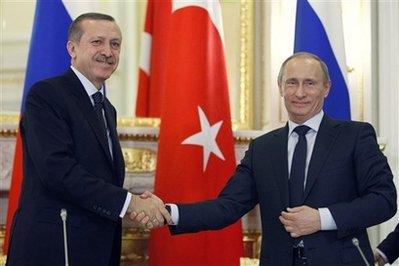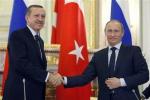

 From the New Atlanticist: While in Moscow, [Turkish Prime Minister Recep Tayyip] Erdogan said that Russo-Turkish “relations are developing and becoming more diversified in the political, military, economic and cultural spheres. What is exciting for me is that both sides have a positive will” to strengthen ties. On the question of visa requirements, Erdogan said “The Prime Minister has just given us the good news that efforts to mutually abolish the visa requirements will go forward as planned.” Turkish officials in Moscow also signed a host of measures that signal closer energy cooperation between the two countries in the future. These included a memorandum for Russia to build nuclear power plants in Turkey and the go-ahead for the Turkish section of Russia’s South Stream gas pipeline. Upon his return to Istanbul, Erdogan announced that he would also host a Russo-Turkish strategic cooperation council meeting during President Medvedev’s planned May visit. Finally, in 2008 Russia became Turkey’s most significant trading partner, and trade volume between the two countries is expected to balloon to $100 billion in the next five years.
From the New Atlanticist: While in Moscow, [Turkish Prime Minister Recep Tayyip] Erdogan said that Russo-Turkish “relations are developing and becoming more diversified in the political, military, economic and cultural spheres. What is exciting for me is that both sides have a positive will” to strengthen ties. On the question of visa requirements, Erdogan said “The Prime Minister has just given us the good news that efforts to mutually abolish the visa requirements will go forward as planned.” Turkish officials in Moscow also signed a host of measures that signal closer energy cooperation between the two countries in the future. These included a memorandum for Russia to build nuclear power plants in Turkey and the go-ahead for the Turkish section of Russia’s South Stream gas pipeline. Upon his return to Istanbul, Erdogan announced that he would also host a Russo-Turkish strategic cooperation council meeting during President Medvedev’s planned May visit. Finally, in 2008 Russia became Turkey’s most significant trading partner, and trade volume between the two countries is expected to balloon to $100 billion in the next five years.
Turkey is Russia’s Germany in the Middle East. Former German Chancellor Gerhard Schröder has allowed Russia to bypass Poland with the planned Nord Stream gas pipeline, just as Erdogan will likely allow Russia to bypass Ukraine with the South Stream gas pipeline. If Europe is uncomfortable with Russian-Turkish ties, it should make a more concerted push for the building of the Nabucco gas pipeline. This would to some extent free Turkey from complete energy dependence on Russia. Yet apart from that, the EU should recognize that Turkey deals with Russia in much the same manner as do many EU states. Business interests reign supreme, and the energy sector is the basis for economic relations. There is little real evidence that Turkey desires much more than economic and energy cooperation from Russia. (photo: Alexander Zemlianichenko/AP)
Image: ap%202%2017%2010.jpg
